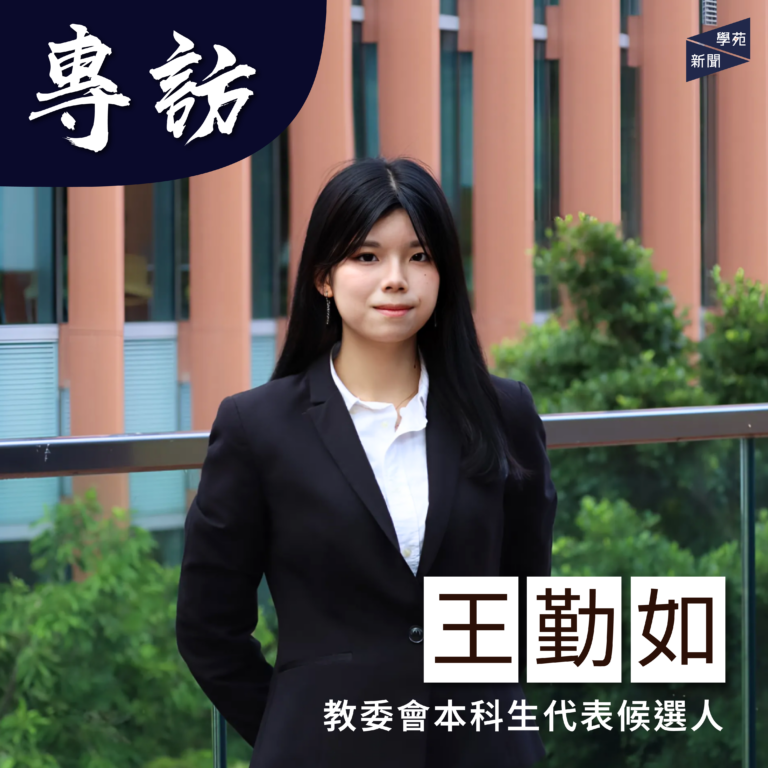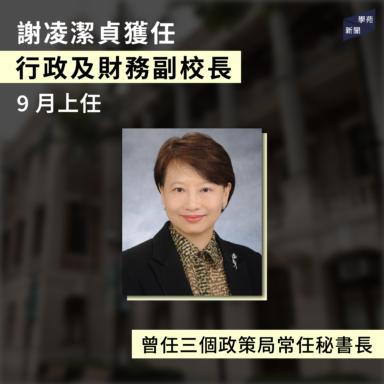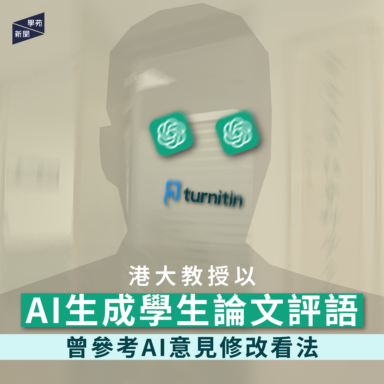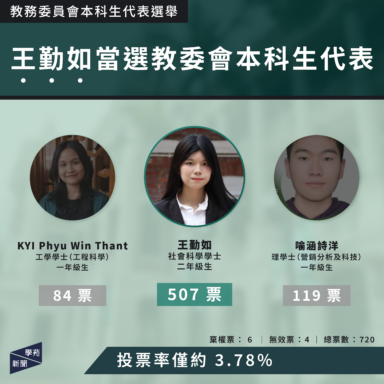
[Please scroll down for English version]
【學苑專訪】香港大學教務委員會本科生代表選舉投票將於明日(5 月 27 日)上午 10 時至 5 月 29 日下午 5 時於線上舉行,三名候選人競逐一個席位。本報訪問候選人 KYI Phyu Win Thant、王勤如(WONG Kan Yu)和喻涵詩洋(YU Hanshiyang),了解其政綱及理念。
王勤如之專訪內容如下。
問:請簡單介紹自己,並簡述參選原因。
王:大家好,我是王勤如,現就讀社會科學二年級。現時擔任大學管治委員會的學生代表,上年亦曾擔任院務委員會學生代表及院會幹事。參選原因是見到學校有不少問題需要着手處理,希望可以向校方提出改善建議,以主導角色反映同學意見。
問:請介紹你的政綱以及你最希望在任期內完成的工作。
王:政綱第一部分和學術事務相關。很多同學反映海外交換計劃的轉移學分制度未夠清𥇦,或過程很長,導致他們可能放棄交換機會,我覺得這一點比較可惜。另一件事關於實習,現在港大有 NETjobs 網站,當中有許多種類的實習資料,但每個種類的帖文只有一兩個,反映資料不足,未必能配合所有學生的需要。我自己是社會科學學院的學生,學院有 SIGC 計劃,以另一套系統回應社科學生的需要。我認為這個計劃不錯,希望在其他學院見到。
第二部分和學生福利有關。很多同學反映大學保健處的健康服務及學生發展及資源中心的輔導服務排隊時間很長,例如大學保健處的物理治療服務,因為人手不足,同學只能隔一兩個月覆診一次,不足以應付他們的需求。另外,輔導服務在 15 至 20 分鐘的面談(screening),或直接預約後,要隔一個月才能見輔導員,接受跟進服務。同學若有緊急個案需要處理,則未能即時獲得援助。參考醫學院的專屬獨立輔導服務,有同學反映該服務質素良好,輔導員亦相當用心。因此,我希望其他學院也能參考這種做法。此外,欣見港大近年來舉辦了許多關於心理健康的推廣活動,且在多個平台上積極宣傳相關資訊。然而,這些活動屬預防性質,在後續跟進有所不足。因此,我希望在任期內能夠提升專業協助的部分。
第三部分是校政倡議。如果有機會當選,我希望提升同學對校政的參與度和認知。我認為目前香港大學缺乏一個長期性的意見收集平台。雖然之前的大學管治委員會曾通過問卷等方式收集意見,但這些方式多為針對特定議題,並未建立一個長期供同學反映意見的渠道。因此,我希望能利用自己的社交媒體,讓更多同學在遇到問題時能夠即時反映,同時也希望透過該平台向同學傳達學校最新政策的情況,以及學校提供的各種免費資源等資訊,讓同學更了解他們所處的環境。
問:就健康服務及輔導服務供不應求、輪候時間過長,有何替代方案?
王:在提升學生心理健康意識方面,我認為學校目前已投入了不少資源,但同學們可能並不清楚應如何幫助有心理健康問題的朋友。我認為朋輩支援是一個值得發展的方向。雖然學校設有精神健康急救班,但每學期開設的班次不足,因此增加精神健康急救班也是值得考慮的方向。另外,希望能收集更多數據,向學校反映同學們對心理健康資源的需求,例如線上或面對面輔導。此外,我也希望能透過問卷調查,了解同學們對學校心理健康資源的認知程度,以及使用後的意見反饋。我收到不少反饋,指出排隊時間過長。我認為校方可以與更多外部機構合作,例如將一些緊急個案轉介給其他專業機構,這既能縮短排隊時間,亦能更好地滿足有緊急需求的學生。
問:如何評價現時校方與不同學生組織的關係?
王:我認為校方確實有嘗試為學生提供更多資源,例如註冊學生組織之資助分配諮詢委員會有撥款給不同學生組織舉辦活動。然而,CCSO(課外活動支援處)的取態及做法較為嚴格,例如當他們看到涉及「學生會」等字眼時,態度往往較為強硬,並可能實施處罰。這反映出學生與校方之間仍存在一定的界限和隔閡。此外,近期宿生會的情況也值得關注。宿生會的銀行帳戶原本由其自身管理,但最近校方收回其管轄權。這使校方以「由上而下」(top-down)的方式制定政策,壓縮學生的自主空間。由於財務管理對每個學生組織都至關重要,校方在這方面的處理則比較嚴苛。
問:你對師生共治有何期望?
王:我認為師生共治的大原則是學生自治,但現時學生參與校政的機會確實減少。此外,由於學生代表的職能較為分散,難以整合學生的意見並有效向校方反映,導致大家對校政的了解變得有限,聲音也更難表達。因此,在學生自治這一方面,空間有所收窄,也影響師生共治的空間。然而,我認為這並非無法改善,即使空間再小,依然存在可以協商的空間或學生可以參與的領域。我認為教委會的工作不應僅限於委員會內部,而是所有香港大學的學生都能參與其中。我希望大家能多了解、多表達,共同努力實現師生共治。
問:你同時擔任學生事務委員會本科生代表,委員會隸屬教務委員會。你若當選,會否對教委會本科生代表的工作造成任何影響?
王:我認為會帶來正面影響。擔任不同角色的學生代表讓我累積了相當的經驗,例如在與學校溝通時需要注意的事項,以及學生和校方關注的議題有何不同。這使我對校政有更深入的了解,知道如何更有效地讓學生的聲音被聽見。此外,由於學生事務委員會隸屬於教委會,若有意見需要提出,通常需要經過多一層程序才能傳達至教委會。如果我有機會擔任教委會的本科生代表,便能更直接地參與教委會的會議,並利用這個身份提出相關問題,從而更迅速地解決問題,並反映學生的意見。
問:會否擔心兩者職能重疊?
王:我認為在某種程度上確實會有重疊。某些議題確實可能需要多次討論,但如果一個政策需要經過多重討論,這也代表其有一定的重要性。因此,我希望能夠更踴躍地參與這些討論,並積極收集學生的意見和聲音,持續關注學生的反饋。待相關議題得到充分討論後,才推行相關政策或作出最終決定。至於職能重疊的問題,確實存在,但教委會處理的事務範圍更為廣泛。除了學生事務外,還包括教與學等各方面的事宜,這些都是學生事務委員會無法涵蓋的部分。
問:請評價港大推出的「人工智能素養微證書」必修課程。
王:這個課程面向下一年入學的本科生。雖然未有太多詳情,但人工智能的發展是大勢所趨,同學在生活中無可避免地會接觸,所以我覺得發展人工智能是正面的,對學生也有幫助。五、六年前港大已推出跨學科課程,開始發展人工智能相關的東西。近年也有很多不同學院開始發展不同的新課程,例如中大有一個專門學習人工智能的學士課程。但我覺得課程設計上,要審視如何更貼近學生需要。除了讓學生提高對人工智能的認知,也要讓學生知道怎樣在他們的學科中應用或怎樣輔助他們學習。而且,此課程只有 3 個學分,有別於平時 6 個學分的課程,希望工作量可以符合 3 個學分的範圍。
問:請評價紀律委員會學生小組代表的產生機制。
王:現時紀律委員會學生小組由 20 個學生組成(編按:應為 30 個學生)。此產生方法經過修訂,以前由學生會評議會委任,再由學生會會長將名單交給教務長,現時變成大家所知的公投方式產生。我認為這個改動降低了學生參與校政的門檻,因為所有人都可以參選,且大家都有資格投票,同學有更多方式去參與校政。我覺得是個不錯的機會讓大家真正接觸港大事務。
問:對港大防詐騙網上測驗,你有否評論?
王:我認為校方的用意是好的,尤其考慮到近期有不少學生遭遇詐騙等問題。然而,這項政策過於嚴苛,因為它限制了一些學生本應享有的權利,例如進入智華館或圖書館等,這可能對同學的校園生活造成因擾。此外,我認為這項措施在制定過程中並未充分諮詢學生代表的意見。當時我們曾向校方詢問有其他替代方案,但校方僅表示會考慮相關建議,並未作出任何具體承諾。因此,我們認為這項舉措並不可取。同時,許多同學也反映,相關問卷的設計內容過於簡單淺白,未必能有效提升他們的防騙意識。
問:對強制分配室友政策,你有否評論?
王:雖然政策於 24 年才正式推行,但 17 年已有提出,在利銘澤堂試行,當時的反應已未如理想。早兩屆的教委會本科生代表有做問卷調查,結果顯示,本地生和國際生都持反對意見。雖然校方的用意是想促進大家的文化交流,或者提倡包容性,但強制性將學生配對,反而可能因為文化差異或作息不同而產生更大摩擦。而且,此政策推出的時候,有些漠視學生意見。我認為文化交流本身「無得逼」,既然有如此多反對意見,校方可以重新審視或調整此政策。校方近兩年有收集對強制配對政策的意見。但學生事務委員會沒有特別討論相關議題,我也不肯定宿舍委員會的會議有否討論。
問:你認為有沒有必要提升非本地生在宿堂的參與度?
王:我自己住過宿舍,我認為校方無需特別提升他們的參與度。很多活動都有國際生參與,大家在宿舍公共空間遇到時都會打招呼或聊天。此外,在校園內亦有許多機會透過活動認識不同的國際學生。因此,我認為學生之間的包容性已經相當不錯,彼此之間並不存在明顯隔閡。相反,如果我們強迫國際生參與,可能引起他們的反感。我認為應該給予學生自主決定的空間,而不是由校方強制要求他們參與更多活動,這樣的做法並無必要。
問:你想對選民說的話。
王:有些人可能會覺得校政的風氣變弱,或者大家不再那麼關心大家所處的環境,但我並不認同這種看法。因為從你踏入香港大學的那一刻起,校政就與每個人息息相關,而校園生活也離不開校政。先前也看到許多關於校園設施的討論,大家都有自己的聲音和意見,但可能缺乏一個統一的渠道來表達這些聲音,這使得大家難以將這些意見傳達給學校。學生作為校園內最大的持份者,本應擁有一定的知情權、參與權和話語權。在我過往擔任學生代表的經驗中,我發現大家其實仍然非常關心我們所處的環境,但可能由於種種無力感或習得性無助,使得大家對這些事務的熱情有所減退。然而,我希望大家依然相信參與校政的價值,並相信學生的聲音仍然具有一定的分量。因此,我希望大家在即將到來的教務委員會本科生代表選舉中投票,珍惜依然可以選擇的機會,並更了解我們所身處的地方。
[English Version]
Polling for the election of 1 full-time undergraduate student to the Senate of HKU will be held online from tomorrow (27th May) 10 a.m. to 29th May at 5 p.m., with three candidates running for one seat. Undergrad interviewed candidates KYI Phyu Win Thant, WONG Kan Yu and YU Hanshiyang to find out more about their platforms and beliefs.
The interview with WONG Kan Yu is as follows.
Question: Please briefly introduce yourself and tell us why are you standing in this election?
WONG: Hello, my name is Wong Kan Yu, and I am a year 2 student of the Bachelor of Social Sciences. I am currently the student representative of a University Committee, and I was also the student representative in the Faculty Board and an executive committee member of a Faculty Society last year. I am running for the election because I see that there are a lot of problems that need to be tackled in the university. I hope I can make suggestions to the university for improvement, and reflect the views of students through a leading role.
Question: Please introduce your election platform and what do you wish to achieve the most during your term?
WONG: The first part of my platform relates to academic affairs. I think it is a pity that many students have said that the credit transfer system of overseas exchange programmes is not clear enough or the time taken is very long, which may cause them to give up the exchange opportunity. Another thing concerns internships. Currently, HKU has a website ‘NETjobs’, which contains information on many types of internships, but there are only one or two posts for each type, indicating that the information is insufficient and may not be able to cater for the needs of all students. I am a student from the Faculty of Social Sciences, and the Faculty has a SIGC programme, which is another system to respond to the needs of social science students. I think this is a good programme, and I hope to see it instituted.
The second part is related to student welfare. Many students have expressed that the waiting time for the health services of the University Health Service and the counselling services of the Centre of Development and Resources for Students is very long. For example, due to the shortage of manpower in the physiotherapy service of the University Health Service, students can only receive follow-up consultation once every one or two months, which is insufficient to meet their needs. In addition, for counselling services, after a 15 to 20-minute face-to-face screening or direct booking, students can only meet with the counsellors one month later to receive follow-up services. Students with urgent needs cannot receive immediate assistance. Some students have reflected that the independent counselling service provided by the Faculty of Medicine service is of good quality and the counsellors are very attentive. Therefore, I hope that other faculties can also refer to this practice. In addition, I am glad to see that HKU has organised many promotional activities on mental health in recent years and actively publicised the relevant information on a number of platforms. However, these activities are preventive in nature and follow-up actions are inadequate. Therefore, I hope to enhance the part on professional assistance during my term of office.
The third part is to advocate for university affairs. If I am elected, I hope to enhance students’ participation and awareness in university affairs. In my opinion, HKU currently lacks a long-term platform for collecting opinions. Although the previous University Committees have collected views through questionnaires and other means, they mostly focused on specific issues yet a long-term channel for students to reflect their views has not been established. Therefore, I hope to make use of my social media to enable more students to reflect their views immediately when they encounter problems. At the same time, I hope to use the platform to convey students of the latest university policies and information of the various free resources provided by the university, so that students can better understand the environment they are in.
Question: Regarding the unmet demand for health services and counselling services and the excessively long waiting time, what are the alternatives?
WONG: In terms of raising students’ awareness of mental health, I think the school has already invested a lot of resources in this area, but students may not be aware of how they can offer help to their friends with mental health problems. I think peer support is a direction worth developing. Moreover, although schools have set up mental health first-aid classes, the number of classes offered in each term is not enough. Therefore, I think enhancing the promotion of peer support and increasing the number of mental health first aid classes are directions worth considering. In addition, I hope that more data can be collected to reflect the demand of students for mental health resources, such as online or face-to-face counselling. Moreover I also hope to find out, through questionnaires, the extent of students’ awareness of mental health resources in schools and their feedback after using them. I have received a lot of feedback that the waiting time is too long. I think we can work with more external organisations, e.g. referring some urgent cases to other professional organisations, which can shorten the waiting time and better serve the students with urgent needs.
Question: What is your view on the relationship between the university and different student organisations?
WONG: I think the university does try to provide more resources for students, for example, the Consultative Committee on Funding Allocation to Registered Student Societies discusses and allocates funds to different student organisations to organise activities. However, the attitude and practice of the CCSO (Co-curricular Support Office) are stricter. For example, when they see words like ‘Student Union’ involved, they tend to be more forceful and may impose penalties. This reflects that there is still a certain boundary and barrier between students and the school authorities. In addition, the recent case of the Student Associations of Halls is also a cause for concern. The bank accounts of the Associations were originally managed by the Associations themselves, but the school authority has recently taken back control. This has resulted in a ‘top down’ approach to policy making, which has reduced the room for student autonomy. Since financial management is crucial to every student organisation, the university has been more stringent in this area.
Question: What are your expectations for co-governance between teachers and students?
WONG: I think the general principle of co-governance between teachers and students is self-governance of students, but the opportunities for students to participate in school administration are indeed reduced nowadays. In addition, since different functions are scattered among various posts of student representatives, it is difficult to integrate students’ opinions and effectively reflect them to the university, resulting in students having limited understanding of school politics and difficulty in expressing their voices. Therefore, the space for self-governance of students has been narrowed, which also affects the space for co-governance between teachers and students. However, I do not think this is impossible to improve, and even if the space is small, there is still room for negotiation or areas where students can participate. I believe that the work of the Senate should not be limited to its internal affairs, but that all students of the HKU can participate in it. I hope that everyone can understand more, express more, and work together to achieve co-governance between teachers and students.
Question: You are also the undergraduate student representative of the Committee on Student Affairs, which is under the Senate. If you are elected, will this have any impact on the work of the undergraduate representative to the Senate?
WONG: I think it will have a positive impact. Serving as a student representative in different roles has enabled me to gain considerable experiences, such as what to look out for when communicating with the university, and how the concerns of students and the university differ. This has given me a better understanding of university affairs and how to let students’ voices be heard more effectively. In addition, since the Committee on Student Affairs is under the Senate, if there are opinions that need to be voiced, they usually need to go through an additional layer of procedures before they can be conveyed to the Senate. If I have the opportunity to serve as an undergraduate student representative to the Senate, I will be able to participate more directly in Senate meetings and use this position to raise relevant issues, thus solving problems more quickly and reflecting the views of students.
Question: Are you worried about the overlapping of functions between the two?
WONG: I think there is indeed overlapping to a certain extent. It is true that certain issues may need to be discussed many times, but if a policy needs to be discussed many times, it means that it has a certain degree of importance. Therefore, I hope that I can participate more actively in these discussions and actively collect the views and voices of students and pay constant attention to their feedback. It is only after the relevant issues have been fully discussed that the policies will be implemented or final decisions can be made. As for the problem of overlapping functions, it does exist, but the scope of affairs handled by the Senate is much wider. Apart from student affairs, it also includes matters related to teaching and learning, which are not covered by the Committee on Student Affairs.
Question: Please comment on the mandatory AI course Artificial Intelligence Literacy I introduced by HKU.
WONG: This course is open to undergraduate students who will be admitted next year. Although there are not many details yet, the development of AI is an inevitable trend and inevitably students will be exposed to it in their lives, so I think the development of AI is positive and will also be helpful to students. Five or six years ago, HKU launched interdisciplinary courses and began to develop things related to AI. In recent years, many universities have begun to develop different new courses. For example, CUHK has a bachelor’s degree program specializing in AI. But I think that in terms of course design, we need to examine how to better meet the needs of students. In addition to improving students’ understanding of AI, students should also know how to apply it in their subjects or how AI can assist their learning. Also, this course only bears 3 credits, unlike the usual 6 credits, so hopefully the workload will fit within the 3 credit range.
Question: Please comment on the election mechanism of the student panel of the Disciplinary Committee.
WONG: The current student panel of the Disciplinary Committee consists of 20 students (Editor’s note: It should be 30 students). This method of selection has been revised. Previously, the Council of the Students’ Union would appoint the members, and the President of the Union would submit the name list to the Registrar. Now, as we know, members of the panel are elected. I think this change lowers the threshold for students to participate in school administration. Because everyone can run for election and vote, students have more ways to participate in school politics. I think this is a good opportunity for everyone to truly get involved in HKU affairs.
Question: Do you have any comments on the online anti-scam tests?
WONG: I think the university had a good intention, especially considering that many students have recently encountered problems such as scam. However, this policy was too harsh as it restricted some rights that students should originally enjoy, such as access to the Chi Wah Learning Commons or the libraries, which may cause inconvenience to students’ campus lives. Furthermore, I think student representatives were not adequately consulted when formulating this policy. At that time, we asked the university whether there were any other alternatives, but the university only said that it would consider the suggestions and did not make any specific promise. Therefore, we think that this policy was not desirable. At the same time, many students also expressed that the design of the questionnaire was too simple and straightforward, and might not be able to effectively enhance their fraud awareness.
Question: Do you have any comments on the compulsory roommates pairing policy in residential halls?
WONG: Although the policy was formally implemented in 2024, it was proposed in 2017 and tried out in R.C. Lee Hall, but the response at that time was already unsatisfactory. The undergraduate student representative to the Senate in the two previous terms had conducted questionnaires, and the results showed that both local and international students were opposed to the policy. Although the intention of the university is to promote cultural exchange or inclusiveness, the mandatory pairing of students may lead to greater conflicts due to cultural differences or differences in daily routines. Moreover, when this policy was introduced, it somewhat ignored the views of students. In my opinion, there is no need to ‘force cultural exchanges’. Since there are so many opposing views, the university can review or adjust this policy. In the past two years, the university has collected views on the compulsory pairing policy. However, the Committee on Student Affairs has not specifically discussed the relevant topics, and I am not sure if the topics have been discussed in the meetings of the Committee on Halls.
Question: Do you think there is a need to enhance the participation of non-local students in residential halls?
WONG: I have stayed in a residential hall myself and I don’t think there is a need for the university to specifically enhance their participation. International students are already involved in a lot of activities, and when they meet each other in common areas of halls, they will greet or chat with each other. There are also many opportunities on campus to meet different international students through events. Therefore, I think there is already a good level of inclusiveness among students and there is no obvious barrier between them. On the contrary, if we force international students to participate, it may cause resentment among them. I think students should be given the freedom to make their own decisions, rather than being forced by the university to participate in more activities, which is unnecessary.
Question: Words to your electors?
WONG: Some people may think that the atmosphere of university affairs has weakened, or that people are no longer so concerned about the environment they are in, but I don’t agree with this view, because from the moment you set foot in HKU, university affairs are closely related to you, and campus life is also inseparable from university affairs. I have seen a lot of discussions on campus facilities before, and we all have our own voices and opinions, but perhaps there is a lack of a unified channel to express these voices, which makes it difficult for us to convey these opinions to the university. As the largest stakeholders on campus, students should have the right to know, the right to participate and the right to speak. In my past experience as a student representative, I have found that people are still very much concerned about the environment we live in, but their enthusiasm for these issues may have waned due to a sense of powerlessness or learned helplessness. However, I hope that we still believe in the value of participating in school politics and that the voice of students still carries some weight. Therefore, I hope that you will vote in the upcoming election of the undergraduate representative to the Senate, and that you will cherish the opportunity we still have to make choices and learn more about the place we are in.



